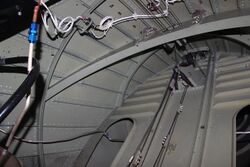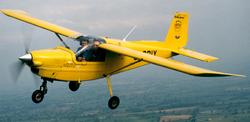Engineering:Semi-monocoque
The term semi-monocoque or semimonocoque refers to a stressed shell structure that is similar to a true monocoque, but which derives at least some of its strength from conventional reinforcement. Semi-monocoque construction is used for, among other things, aircraft fuselages, car bodies and motorcycle frames.
Examples of semi-monocoque vehicles
Semi-monocoque aircraft fuselages differ from true monocoque construction through being reinforced with longitudinal stringers.[1][2] The Mooney range of four seat aircraft, for instance, use a steel tube truss frame around the passenger compartment with monocoque behind.[3]
The British ARV Super2 light aircraft has a fuselage constructed mainly of aluminium alloy, but with some fibreglass elements. The cockpit is a stiff monocoque of "Supral" alloy, but aft of the cockpit bulkhead, the ARV is conventionally built, with frames, longerons and stressed skin forming a semi-monocoque.[4]
Peter Williams' 1973 Formula 750 TT-winning John Player Norton racer was an early example of a semi-monocoque motorcycle.[5]
See also
References
- ↑ "Definition of SEMIMONOCOQUE". http://www.merriam-webster.com/dictionary/semimonocoque.
- ↑ "Semi Monocoque, Mono-what?". http://www.aviationchatter.com/2010/01/semi-monocoque-mono-what/.
- ↑ Mooney article [1]
- ↑ "Pilot" magazine, June 1985 pages 5-6
- ↑ "Peter Williams Motorcycles | Jpn Monocoque Replica". http://peterwilliamsmotorcycles.com.
 |




